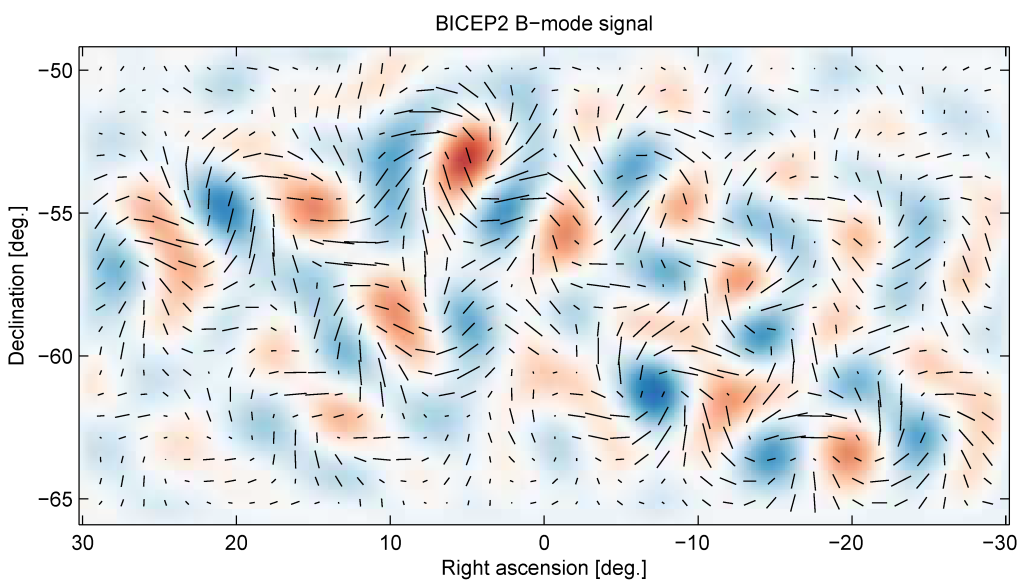Science Seen Physicist and Time One author Colin Gillespie helps you understand your world.
When Science Gets It Wrong
“Gravitational waves turn to dust” shouts a headline in The Guardian newspaper. Its news is that last month’s news of a Harvard team’s discovery of gravitational waves from the beginning of time may not reveal such waves at all. That stunning signal could have come from grains of dust in space.
It’s no surprise when science news is challenged. Science―including physics―gets things wrong all the time. Discovering, publishing, challenging and correcting is the process by which science finds its way. The most widely respected scientist of all time, Albert Einstein, notoriously often changed his mind. He once wrote to a colleague with wry humor, ‘Einstein has it easy. Every year he retracts what he wrote in the preceding year; now the sorry business falls to me of justifying my latest retraction.’ In science, error correction is central to success, not a badge of shame.
Even when science seems to get it right it is just a way station on a longer journey. Physics’ two mutually inconsistent central theories, general relativity and quantum mechanics, are widely regarded as only approximations to a better theory. But meantime they work well.
So what about the latest news? To me it bears two messages. I already stuck my neck out and said the ripples are ‘the most important scientific observation of all time’. No doubt the dust-grain debate will go on. And other teams are closing in with their own instruments and methods. My bet is the ripple signal either was or soon will be found. This current skirmish will turn out to mostly be about who gets the credit and the trip to Sweden.
The second message showcases a change in the process of science. Until recently, the protocol was: First submit your paper to a refereed journal; only when accepted for publication should you talk to the press. The idea is, the expert referees selected by the editor will screen all suspect stories out; the press cannot. But academe has no special protection from the digital wave that is transforming the publishing landscape. As with other claimed advances in physics, the authors of this one chose to send it (all this needs is email) to Cornell University’s arXiv site, where in mere minutes it became available online.
Compare this with the weeks and months that publication in a refereed journal requires. And discussion that not long ago might wait for a conference now starts that same day. As Ian Sample, science editor for The Guardian, ungrammatically observed:
But within hours of making the announcement, scientists began to raise concerns. The criticisms have been building up steadily on physics blogs ever since.
In other words, what once was slow and private is becoming swift and public.
For physicists and for all the rest of us, that seems to me like two good things.
Sources
Ian Sample (2014), “Gravitational waves turn to dust after claims of flawed analysis”, The Guardian, June 4; http://www.theguardian.com/science/2014/jun/04/gravitational-wave-discovery-dust-big-bang-inflation
Albert Einstein (1915), letter to Paul Ehrenfest, December 26, in The Collected Papers of Albert Einstein, Ann Hentschel (tr.), Princeton: Princeton University Press, vol. 8, p. 167; see also Abraham Pais (1982), Subtle Is the Lord: The Science and the Life of Albert Einstein, Oxford: Oxford University Press, p. 250
Image Credit: BICEP2 Collaboration
Other reading:
P.A.R. Ade et al, “BICEP2 I: Detection of B-mode Polarization at Degree Angular Scales”, http://arxiv.org/abs/1403.3985
Colin Gillespie (2013), “The Problem of Two Theories”, in Time One: Discover How the Universe Began, New York: RosettaBooks, p. 157, http://www.rosettabooks.com/book/time-one/, excerpted at http://www.timeone.ca/chapters/the-problem-of-two-theories.pdf


No comments yet.